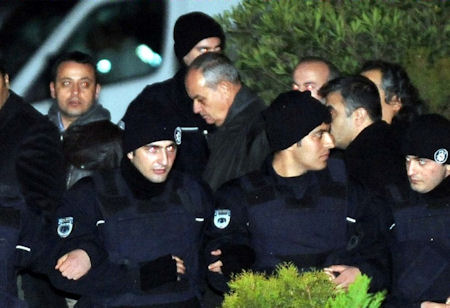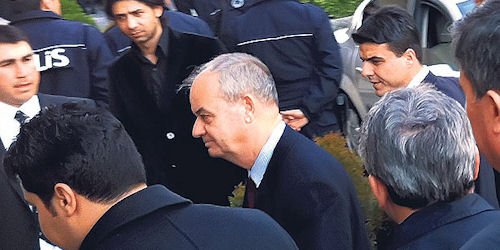![]()
Mon, Jan 09, 2011 | By Gareth H. Jenkins
The Changing Objects of Fear: The Arrest of Ilker Basbug
This article was first published in the Turkey Analyst, vol. 5 no. 1 (www.turkeyanalyst.org), a biweekly publication of the Central Asia-Caucasus Institute & Silk Road Studies Program Joint Center. © Central Asia-Caucasus Institute & Silk Road Studies Program Joint Center, 2012.
In the early hours of January 6, 2012, General İlker Başbuğ, who served as chief of the Turkish General Staff from 2008 to 2010, was arrested and imprisoned on allegations of “founding or directing an armed terrorist organization” and “inciting the overthrow of the government of the Turkish Republic or the prevention of it fulfilling its duties”. For many, the arrest of Başbuğ on terrorist charges will be regarded not so much as demonstrating that the General staff is no longer untouchable but that the Fethullah Gülen Movement has the power to imprison whoever it likes.
Background
The charges follow a judicial investigation into a number of websites allegedly controlled by the military which had published derogatory articles about the ruling Justice and Development Party (AKP). The investigation is being conducted by the same group of prosecutors and investigators as are responsible for the long-running Ergenekon and Sledgehammer cases, which have become notorious for their numerous absurdities and abuses, including repeated breaches of due process, patently fallacious conspiracy theories and even the inclusion in their indictments of manifestly fabricated evidence.
However, in the case of the military-run websites, the charges do at least appear to be grounded in reality. It is no secret that in the past the Turkish General staff frequently ran black propaganda campaigns against perceived threats to the unitary, secular state; such as Kurdish nationalists and Islamist activists. Nevertheless, both the specific charges against Başbuğ and the manner in which the investigation has been conducted have intensified already serious concerns about the credibility of the Turkish judicial system amid growing fears that the country is slipping into a new era of repressive authoritarianism.
Turkey’s state security policy is based on what is known as the National Security Policy Document (NSPD), which is updated every five years and details the perceived threats to the country’s security. For most of Turkey’s recent history, the NSPD was effectively drafted by the Turkish General Staff and then endorsed unchanged by the civilian prime minister. During the 1990s, the NSPD identified two main threats to domestic security: Kurdish separatism and what was termed Islamic fundamentalism, which in practice meant almost any attempt to amend the prevailing interpretation of secularism. Under the de facto system of military tutelage which characterized Turkey during the 1990s, successive civilian governments delegated responsibility for implementing the NSPD to the General staff and made little attempt to monitor or restrict its activities. During this period, both the General staff and the National Intelligence Organization (MİT) conducted black propaganda campaigns, whether overtly through the production of reports and pamphlets or covertly through the planting of stories in the media.
With the spread of internet use in the late 1990s, the General staff also began to use websites for propaganda purposes; again both overtly (such as publishing materials on its own website) and covertly. Such practices would be regarded as unacceptable in most democratic countries. But, when challenged, members of the General staff would argue that they were merely fulfilling the duties entrusted to them by the Turkish state and combating the threats to the country’s security as identified in the NSPD. Black propaganda activities against perceived Islamist activists intensified after a short-lived coalition government led by the Islamist Welfare Party was forced to resign in 1997, largely as a result of a campaign orchestrated from behind the scenes by the General staff.
The military continued to use the internet for propaganda purposes through the early 2000s, including after the AKP first came to power in November 2002. Much of the material was directed against the Kurdish nationalist movement, the Greek Cypriots, Armenian accusations of genocide during the late Ottoman Empire and Greek claims regarding territorial waters and airspace in the Aegean. However, the websites also included some critical and derogatory material about the AKP; consisting almost exclusively, not of original content, but of the reproduction of articles by anti-AKP journalists which had first appeared in the mainstream Turkish press.
The number of websites which were run by the General staff is currently unclear. What is undoubted is that the paucity of original content meant that they received few hits; and most of those appear to have been from visitors who were already diehard opponents of the AKP. There is no evidence that the websites had any impact on the AKP’s popularity. Indeed the party increased its share of the popular vote in both the 2007 and 2011 general elections. It is not clear when the last of the websites was closed down, although they all seem to have disappeared from the internet before, or soon after, Başbuğ took over as chief of the General staff on August 30, 2008.
Implications
Although they have accused Başbuğ of membership of an “armed terrorist organization” and inciting the public to overthrow the government, the public prosecutors have yet to draft a detailed indictment. As a result, it is still too early to know how many websites they will accuse him of being responsible for. Sources close to the prosecutors report that, during his interrogation, Başbuğ was questioned about anywhere from 41 to 46 websites. In his defense, Başbuğ is said to have admitted that he learned of the existence of four inactive websites in early 2009 and immediately ordered that they all be closed down. However, prosecutors are also reported to have questioned him about his alleged approval of military-controlled websites while he was deputy chief of the General staff in 2003-2005.
Even if, as some members of the military have argued, the websites were technically legal on the grounds that they were originally established within the scope of the NSPD, the NSPD has since been amended to exclude Islamic fundamentalism as a threat to Turkey’s security. It is also difficult to reconcile any attempt by a country’s military to undermine the popularity of an elected government with commonly held notions of democratic principles.
Nevertheless, even if Başbuğ is eventually found guilty of approving the websites, it is impossible to understand how this can be considered proof of his membership or leadership of an “armed terrorist organization.” Yet this is the charge on which he has been formally arrested and imprisoned. Disturbingly, the hundreds of defendants in the Ergenekon case are charged with belonging to an “armed terrorist organization”; which suggests that Başbuğ will eventually also be accused of membership of Ergenekon; even if, with the investigation well into its fifth year, the prosecutors have yet to produce any convincing evidence that the organization ever existed.
Similarly, Başbuğ was interrogated by Cihan Kansız, a public prosecutor who has been granted “special authority” to investigate the Ergenekon case. It was the special court established for the Ergenekon hearings which approved Kansız’s application for Başbuğ’s arrest. Başbuğ was subsequently sent to the same prison in Silivri, outside Istanbul, that is being used to hold hundreds of suspects in the Ergenekon and Sledgehammer cases. Some of the defendants have already spent four years in prison, although there is still no indication of when the court will be able to reach a verdict.
Legal experts pointed out that, under the Turkish constitution, a serving or retired chief of the General staff can only be tried by the Turkish Supreme Court. Burhan Kuzu, the AKP chair of the Parliamentary Commission, responded by claiming that a chief of the General staff could be tried in a special court, such as the one established to try the Ergenekon defendants, if he was accused of something that did not form part of his legal duties. This is not true. Article 148 of the Turkish Constitution simply states: “The chief of staff and the force commanders are tried in the Supreme Court.” It makes no distinction either between activities which are and are not part of their legal duties or between serving and retired officers. Indeed, it is difficult to conceive of the circumstances under which a chief of staff who is discharging his legal duties can be charged with doing something illegal.
Conclusions
Başbuğ is the highest-ranking member of the Turkish military to be arrested since the Ergenekon investigation was first launched in June 2007. When news of his arrest broke, pro-AKP journalists fervently proclaimed that it marked another step towards the “normalization” of civil-military relations and was proof that, with the former commander of the once untouchable General staff behind bars, nobody was now above the law. In reality, the picture is considerably more disturbing.
Defenders of the Ergenekon and Sledgehammer cases often argue that, even if they contain some flaws, they are nevertheless necessary in order to break the political power of the General staff. In fact, the Ergenekon investigation was only launched when the AKP was confident that the General staff was a spent force politically and that the era of military tutelage was finally over. Since 2007, over 600 defendants have been charged in the Ergenekon and Sledgehammer cases, including nearly 400 serving and retired members of the military. In the Sledgehammer case alone, 250 officers are currently in prison pending trial, including more than 50 serving generals and admirals. The case against them rests on a purported coup plot which prosecutors allege was initiated in December 2002 and finalized in March 2003 — even though it contains references to events in 2004, 2005, 2006, 2007 and 2008. As with the prosecutor’s claim that approval of propaganda websites is proof that Başbuğ is a member of an “armed terrorist organization”, the irrationality of the Sledgehammer allegations has failed to halt the case or to persuade the court to release the defendants pending the completion of their trial.
If, as currently seems likely, Başbuğ is eventually explicitly charged with membership of Ergenekon, he will join a motley collection of defendants whose only common characteristic appears to be that they are opposed to the AKP or have alienated followers of the exiled Islamic preacher Fethullah Gülen. Critics maintain that Gülen’s supporters now control large sections of the police force and judicial system and are driving both the Ergenekon and the Sledgehammer investigations. On January 5, 2012, just hours before Başbuğ was arrested, a court in Istanbul rejected an application for the release pending trial of 12 imprisoned Ergenekon suspects. They included the journalists Ahmet Şik and Nedim Şener, who were arrested in March 2011 and charged with membership of the “Ergenekon armed terrorist organization” after writing articles detailing the influence of Gülen’s followers in the police. Others imprisoned after criticizing the movement include Hanafi Avcı, a former police chief, who published a book in August 2010 detailing the penetration of the force by Gülen’s supporters. Avcı was promptly arrested and charged with membership of Ergenekon. He is still in prison pending trial.
Not surprisingly, few Turks are now prepared to publicly question or criticize the Gülen Movement. For many, the arrest of Başbuğ on terrorist charges will be regarded not so much as demonstrating that the General staff is no longer untouchable but that the Gülen Movement has the power to imprison whoever it likes, regardless of the law, due process or the absurdity of the allegations; and further proof that in today’s Turkey it is not the military but the Gülen Movement that people need to fear.
Gareth H. Jenkins is a Senior Fellow with the Central Asia-Caucasus Institute & Silk Road Studies Program Joint Center.



 RSS
RSS













The Changing Objects of Fear: The Arrest of Ilker Basbug | Middle East, Israel, Arab World, Southwes http://t.co/ZK5VUr55
The Changing Objects of Fear: The Arrest of Ilker Basbug | Middle East, Israel, Arab World, Southwes http://t.co/ZK5VUr55